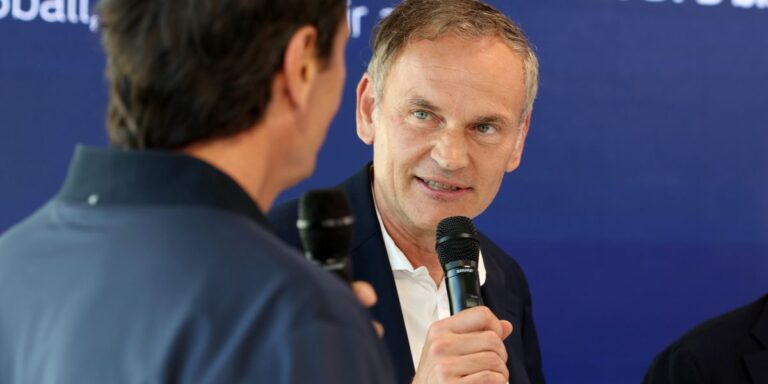
Volkswagen AG’s all-in-one plan for electric vehicles is no more.
The namesake VW brand, which has touted its ID family of electric cars as central to its future, admitted last week it will need more plug-in hybrids as electric vehicle sales slow.
This is just the latest tweak VW has made to its electrification. strategy after the company botched several model launches and fell behind schedule in China, where local brands now dominate. The manufacturer also sidelined efforts to seek outside investors for its battery unit and discarded plans a 2 billion euro ($2.2 billion) electric vehicle factory in Germany.
In fact, the automaker sells so many cars that still run on combustion engines that it is on track to exceed its emissions quota next year, leading its CEO Oliver Blume to ask European regulators to clemency. This is a stark turnaround from just three years ago, when VW’s aggressive lobbying for electric vehicles in the European Union opened loopholes between the company and some of its peers in the region.
VW had no choice but to build on its electrification message after betting heavily on “clean” diesel engines. That gamble backfired when the company was caught cheating on emissions tests, forcing it to turn to battery-powered vehicles. By 2019, then-CEO Herbert Diess announced the launch of as many 75 100% electric models over the next decade.
His “EV or bust” strategy – Diess argued that automakers needed to change quickly if they wanted to survive – angered executives from Turin to Tokyo who wanted more time and flexibility to make the transition from combustion cars. The CEO even praised what he saw as a first-mover advantage.
Electric mobility “won the race,” Diess said when presenting VW’s 2021 battery strategy. “Many in the industry have questioned our approach. Today they are following suit, while we reap the fruits.”
While those gains weren’t as plentiful as VW hoped, the company isn’t turning away from electric cars entirely.
Blume enters into partnerships with companies including Xpeng Inc. and prepares a new brand of electric vehicles in China, offering models equipped with gadgets such as an on-board avatar to win back young consumers lost to BYD Co. and Tesla Inc. VW has also been in discussions with its European peers, including Renault SA, on the development of less electric vehicles. expensive to conquer the mass market. market car buyers.
VW isn’t alone in having to recalibrate due to the slowdown in electric vehicles. Countries like Germany and Sweden have stopped or reduced subsidies for electric cars, which still tend to be more expensive than their combustion counterparts, hurting the sector as a whole. Shortcomings in public charging networks also continue to deter potential buyers.
Stellantis NV announced on Tuesday that it would sell cars co-developed with a Chinese partner in Europe from September to try to lower the cost of its electrical offers. Mercedes-Benz Group AG has stopped development of the bases for new luxury electric sedans to save money and plans to sell cars that run on gasoline. longer than expected. BMW AG, which had more success selling electric vehicles than its German rivals, warned again this week that the EU’s plan to effectively ban the sale of new combustion engine vehicles by 2035 would harm the industry. European regulators are expected to review this policy in 2026.
The downturn has dealt a blow even to Tesla, which has lost $235 billion in market capitalization this year, more than triple VW’s current valuation. CEO Elon Musk nonetheless criticized automakers for backtracking.
“The adoption rate of electric vehicles globally is under pressure, and many other automakers are moving away from electric vehicles and pursuing plug-in hybrids instead,” Musk said last month while discussing the company’s first-quarter results. You’re here. “We believe this is the wrong strategy and that electric vehicles will eventually dominate the market.”


